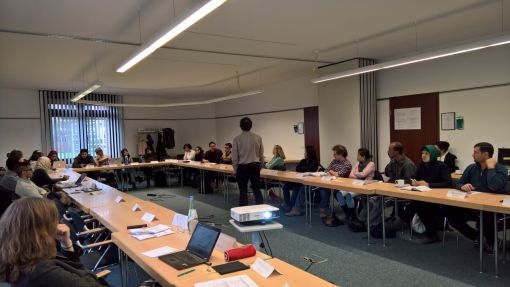Water, energy, food – security in these areas is crucial for every society. How these areas are connected and what interactions occur was discussed by students from three development-related postgraduate courses in Bonn.
The three-day Winter School focused on the “Nexus Approach”. This approach is based on the idea that most areas of human development are more or less structurally linked to one another. Using this interdisciplinary approach, scientists try to bundle the similarities of these areas and bring different perspectives together.
One example is the building of the Nile Dam in Ethiopia. Various challenges must be reconciled – water scarcity, energy production and environmental protection as well as the interests of different countries. The disputes arising from this situation were discussed by participants at the Winter School. Students from all nations bordering the Nile were present to expound their points of view.
Effectively Complemented
“The approximately 40 students complemented each other effectively with their knowledge. In the DAAD-funded courses they deal with questions about water and energy management as well as the production of staple foods in agriculture”, explains Robin Pass. He is network coordinator of the umbrella organisation Association of Postgraduate Programmes with special Relevance to Developing Countries (AGEP) and organised the Winter School “The Nexus of Water, Energy, Soil and Food” with support from the Gustav-Stressemann Institute. Participants discussed various themes in work groups, listened to lectures and visited the German Development Institute.
Students found the exchange to be a very enriching experience. “I learned the perspectives of participants from other fields and their different views on the same topic”, recounts Liz Lucas, student of Agricultural Sciences and Resource Management in the Tropics and Subtropics (ARTS) at the University of Bonn. For Lucia Benavides, who studies Natural Resources Management at the TH Köln, the event came at the right time. “My master’s thesis deals with the natural resource emissions of cities. Right now I’m analysing suitable methods for evaluating the consumption of natural resources in socio-ecological systems – the Nexus Approach is very relevant to this”, says the young woman from Mexico City.
Enriching Discussions
The professors who were present at the Winter School also concluded that it was a success. “The students expressed great interest in the topics and provided a lot of feedback. This quickly turned the original lecture into a discussion”, explains Professor Christoph Schüth, lecturer in the degree course Tropical Hydrogeology and Environmental Engineering at the TU Darmstadt. “The sheer variety of the participants enriched the discussion. This led to interesting dialogues on topics from the home countries”, says Professor Lars Ribbe, Integrated Land and Water Resources Management at the TH Köln.
Follow-Up Planned
The positive feedback encourages the organisers to offer more events based on the Nexus Approach. In the following Winter and Summer Schools, individual regions or certain areas such as water or energy will be highlighted.
More information:
AGEP website
AGEP Winter School: Securing Food for All
AGEP Winter School: The Causes of Forced Migration







